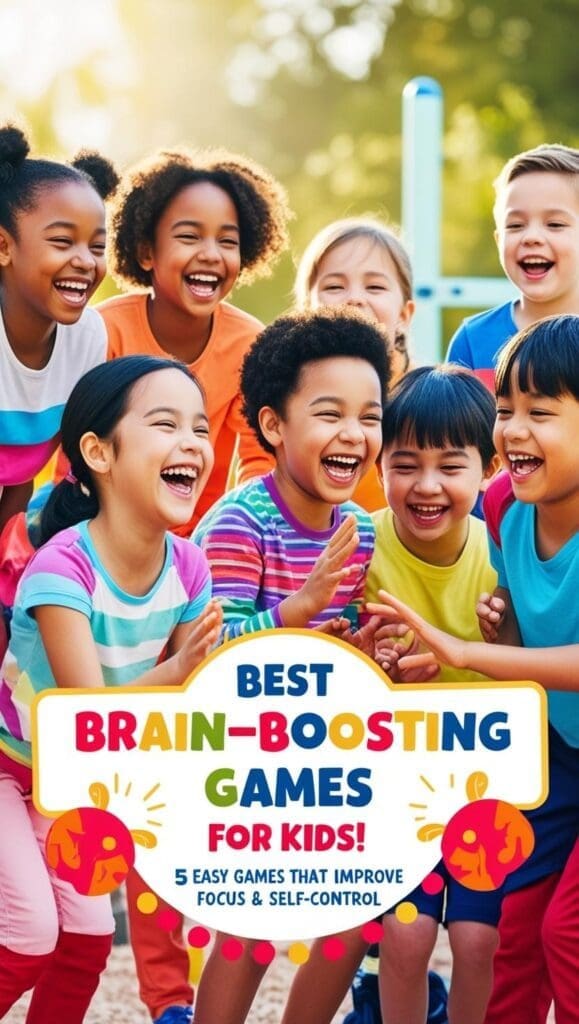What Is Executive Function & Why Does It Matter?
Executive function is a set of higher-order cognitive skills that help us plan, organize, manage time, remember information, and regulate emotions. It allows us to set goals, adapt to new situations, control impulses, and solve problems.
These skills are essential for success in school, relationships, and daily life. A child with strong executive function can follow multi-step instructions, resist distractions, shift between tasks smoothly, and manage frustration when things don’t go as planned.
However, executive function isn’t something we’re born with—it’s developed over time.
How Executive Function Develops in Children
- Infancy & Early Childhood (Ages 0-5): Babies begin developing basic self-regulation skills, like controlling impulses and following simple rules. Games that encourage turn-taking and attention control lay the foundation.
- Middle Childhood (Ages 6-12): This is when executive function begins to strengthen rapidly. Children learn working memory (holding information in their minds), flexible thinking (adapting to new situations), and self-control (resisting impulses).
- Adolescence & Beyond (Ages 13+): The prefrontal cortex—responsible for executive function—is still developing. Teens refine decision-making skills, manage time better, and become more independent in planning and organizing.
Since executive function plays a key role in academic performance, emotional regulation, and future success, parents, teachers, and therapists need to find ways to strengthen these skills. The good news? Games can help!
By playing certain board games, video games, and problem-solving activities, children and teens naturally train their executive function skills in an engaging way. Below are some of the best games designed to boost cognitive flexibility, working memory, and self-control.
1. Chess – The Ultimate Game for Strategic Thinking
Recommended Age Group: 7+ (Kids, Teens, and Adults)
How It Helps:
Chess is one of the most effective games for improving executive function because it requires strategic planning, impulse control, working memory, and cognitive flexibility. Players must think ahead, analyze multiple possibilities, and adjust their strategy in response to their opponent’s moves—all skills that are crucial for strong executive function.
Key Executive Function Skills Strengthened:
✅ Planning & Organization – Players must think several moves ahead, strategizing long-term while adapting to new developments.
✅ Working Memory – Remembering past moves, predicting future possibilities, and recalling strategies all enhance memory skills.
✅ Impulse Control – Acting too quickly can lead to mistakes, so players learn to slow down, assess options, and make thoughtful decisions.
✅ Cognitive Flexibility – Opponents’ moves are unpredictable, requiring constant adaptation and flexible thinking.
How to Use It:
- Encourage regular play at home or in a school setting.
- Join a local chess club to develop both cognitive and social skills.
- Use chess apps like Chess.com or Lichess to practice against different levels of opponents.
2. Simon Says – Strengthening Attention & Self-Control
Recommended Age Group: 3-10 years
How It Helps:
Simon Says is a simple but powerful game for developing attention control, impulse regulation, and working memory. Players must listen carefully to instructions and respond only when they hear “Simon says,” strengthening their ability to focus and filter distractions.
Key Executive Function Skills Strengthened:
✅ Self-Regulation & Impulse Control – Kids must resist acting when “Simon” doesn’t give a command, reinforcing inhibition control.
✅ Working Memory – Players must remember and process multiple-step instructions.
✅ Attention Control – Requires active listening and focus to follow the right commands.
How to Use It:
- Make the game more challenging by increasing the complexity of commands.
- Try variations like “Reverse Simon Says” to further develop cognitive flexibility.
3. Scrabble – Boosting Cognitive Flexibility & Memory
Recommended Age Group: 8+ (Kids, Teens, and Adults)
How It Helps:
Scrabble challenges players to think critically, adapt to available letters, and strategize word placements—all of which enhance executive function skills. The game requires working memory, cognitive flexibility, and strategic planning.
Key Executive Function Skills Strengthened:
✅ Working Memory – Players must keep track of letter tiles, potential words, and board placements.
✅ Cognitive Flexibility – Adjusting strategies based on opponents’ moves and available tiles.
✅ Problem-Solving & Planning – Choosing high-scoring words while blocking opponents.
How to Use It:
- Play family Scrabble nights to encourage strategic thinking.
- Use Scrabble apps to allow kids to play and improve their skills digitally.
4. Minecraft – Open-Ended Problem Solving & Creativity
Recommended Age Group: 7+ (Kids, Teens, and Adults)
How It Helps:
Minecraft isn’t just a video game—it’s a sandbox for creativity, problem-solving, and executive function development. Players must plan, gather resources, build structures, and adapt to challenges, all of which strengthen key cognitive skills.
Key Executive Function Skills Strengthened:
✅ Planning & Organization – Players must gather resources, craft tools, and build structures.
✅ Problem-Solving & Adaptability – Unexpected obstacles require quick decision-making.
✅ Self-Monitoring & Patience – Completing large builds and surviving in the game requires persistence and goal-setting.
How to Use It:
- Encourage creative building projects in the game.
- Try Minecraft Education Edition for structured learning experiences.
5. Card Games (UNO, Go Fish, or Memory Match)
Recommended Age Group: 4+ (Kids, Teens, and Adults)
How They Help:
Card games are fantastic for developing working memory, impulse control, and flexible thinking. Games like UNO require players to react strategically, while Memory Match strengthens recall skills.
Key Executive Function Skills Strengthened:
✅ Working Memory – Players must track cards, rules, and strategies.
✅ Impulse Control – Resisting the urge to play certain cards immediately.
✅ Cognitive Flexibility – Adjusting strategies based on new cards or moves.
How to Use It:
- Play simple card games for younger children.
- Introduce complex card games like Poker or Rummy for teens and adults.
Final Thoughts: Why Games Are an Effective Tool for Cognitive Growth
Executive function skills aren’t just about school success—they impact everyday life, from managing emotions to making responsible decisions. The best way to strengthen these skills is through engaging, real-world practice—and games provide the perfect opportunity.
By incorporating strategic games into daily routines, children and teens develop critical thinking, adaptability, and self-control in a fun and interactive way. Whether it’s chess, Minecraft, Scrabble, or a simple game of Simon Says, each of these activities strengthens a key component of executive function.
Encourage your child to play, explore, and challenge themselves—because the skills they develop today will shape their future success.
Would you like any refinements or additional games included? 😊

About the Author
Hi, I’m Eve, a former school counselor with a master’s degree in School Psychology and a passionate advocate for children and families navigating sensory challenges. As a mom of children with sensory sensitivities, I deeply understand the journey special-needs parents face, and I dedicate myself to researching and sharing practical solutions to help children thrive and feel comfortable in their bodies. My goal is also to empower counselors, therapists, and psychologists with creative strategies and supportive resources to enrich their everyday practice. When I’m not writing or exploring new therapeutic approaches, you’ll find me spending quality time with my family and continually seeking inspiration from everyday moments.



